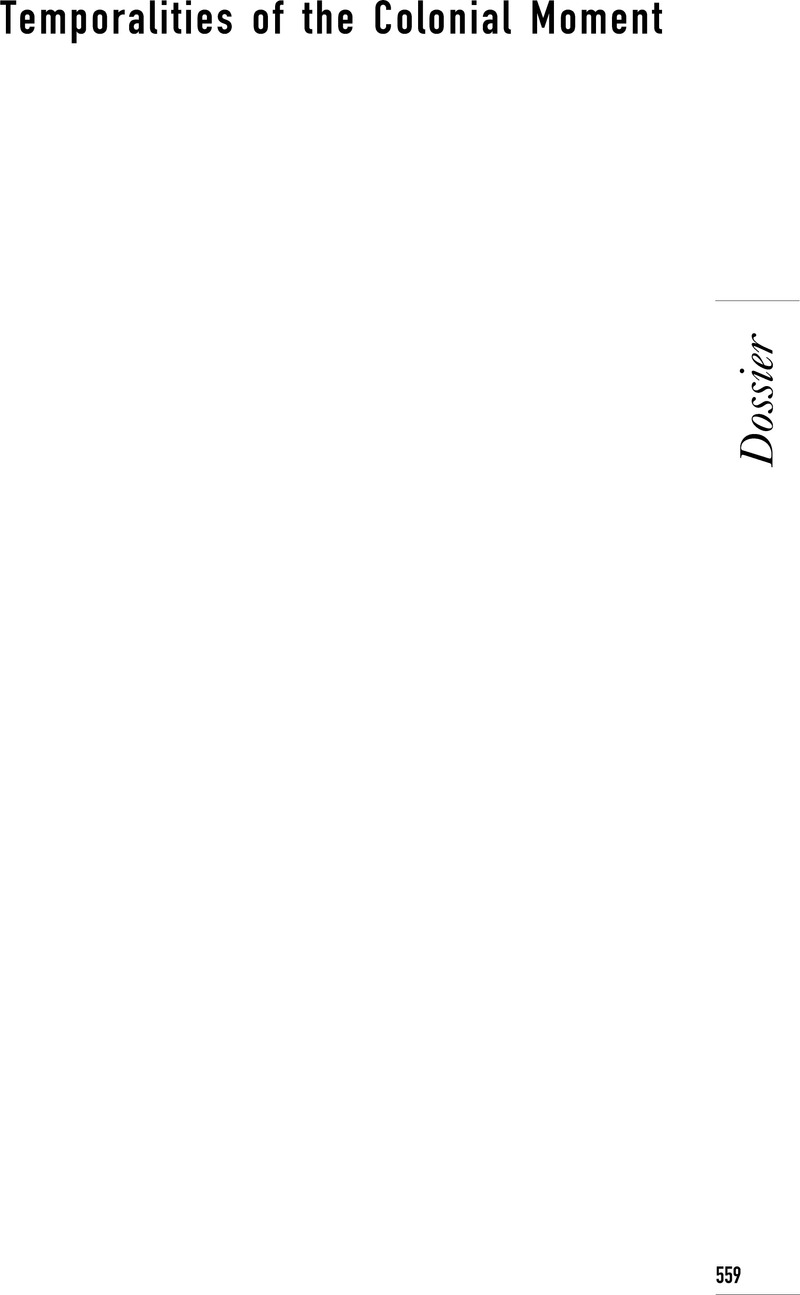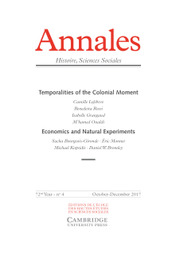No CrossRef data available.
Article contents
Putting the Colonial in Its Place: Interlacing Histories of Early Colonization in West Africa and the Maghreb
Published online by Cambridge University Press: 21 June 2021
Abstract

- Type
- Temporalities of the Colonial Moment
- Information
- Annales. Histoire, Sciences Sociales - English Edition , Volume 72 , Issue 4 , December 2017 , pp. 559 - 566
- Copyright
- © Éditions EHESS 2021
Footnotes
We would like to thank Isabelle Grangaud, Alexis Rappas, Benedetta Rossi, James McDougall, Aïssatou Mbodj-Pouye, Cécile Vidal, and Vanessa Caru for their contributions in putting together this dossier, as well as Catherine Virlouvet and Fabrice Jesné for their welcome at the École française de Rome.
References
1. Michel Naepels, War and Other Means: Power and Violence in Houaïlou (New Caledonia) [2012], trans. Rachel Gomme (Canberra: ANU Press, 2017), 284.
2. This type of approach has been implemented in African history, where recent publications have emphasized the long history of slavery, racial discourses, and borders from the nineteenth century to the present day, including during colonization: Bruce S. Hall, A History of Race in Muslim West Africa, 1600 – 1960 (Cambridge: Cambridge University Press, 2011); Benedetta Rossi, From Slavery to Aid: Politics, Labour, and Ecology in the Nigerien Sahel, 1800 – 2000 (Cambridge: Cambridge University Press, 2015); Camille Lefebvre, Frontières de sable, frontières de papier. Histoire de territoires et de frontières, du jihad de Sokoto à la colonisation française du Niger, xix e – xx e siècles (Paris: Publications de la Sorbonne, 2015).
3. Romain Bertrand, “Politiques du moment colonial. Historicités indigènes et rapports vernaculaires au politique en ‘situation coloniale,’” Questions de recherche 26 (2008): 1–49, here pp. 23 – 25.
4. Achille Mbembe, On the Postcolony (Berkeley: University of California Press, 2001), 9.
5. Michel Naepels, “Anthropologie et histoire : de l’autre côté du miroir disciplinaire,” Annales HSS 65, no. 4 (2010): 873 – 84, here p. 884.
6. Johannes Fabian, Time and the Other: How Anthropology Makes its Object (New York: Columbia University Press, 1983; repr. 2014), 173.
7. Isabelle Grangaud and M’hamed Oualdi, “Tout est-il colonial dans le Maghreb ? Ce que les travaux des historiens modernistes peuvent apporter,” Revue d’histoire moderne et contemporaine 63, no. 2 (2016): 133 – 56.
8. Romain Bertrand, L’histoire à parts égales. Récits d’une rencontre Orient-Occident, xvi e– xvii e siècle (Paris: Éd. du Seuil, 2011), xx.
9. Isabelle Grangaud, “Prouver par l’écriture. Propriétaires algérois, conquérants français et historiens ottomanistes,” Genèses 74, no. 1 (2009): 25 – 45, has shown how the collections known as the Archives ottomanes de l’Algérie (Ottoman Archives of Algeria) were partly a colonial creation assembled after the French army’s conquest of Algeria in 1830.
10. For ways to read against the grain, see Jean Comaroff and John Comaroff, Of Revelation and Revolution, vol. 1, Christianity, Colonialism, and Consciousness in South Africa, and vol. 2, The Dialectics of Modernity on a South African Frontier (Chicago: University of Chicago Press, 1991 and 1997). For reading along the grain, see Ann Laura Stoler, Along the Archival Grain: Epistemic Anxieties and Colonial Common Sense (Princeton: Princeton University Press, 2009).
11. Éloi Ficquet and Aïssatou Mbodj-Pouye, “Cultures de l’écrit en Afrique. Anciens débats, nouveaux objets,” Annales HSS 64, no. 4 (2009): 751 – 64.
12. Ousmane Oumar Kane, Beyond Timbuktu: An Intellectual History of Muslim West Africa (Cambridge: Harvard University Press, 2016).
13. The “colonial library” is discussed in Vumbi Y. Mudimbé, The Invention of Africa: Gnosis, Philosophy, and the Order of Knowledge (Bloomington: Indiana University Press, 1988). It refers to the ensemble of intellectual and practical knowledge on Africa produced in a colonial context and contributing to the construction of the continent’s image. On the “African library,” see Kane, Beyond Timbuktu.
14. Jean-Frédéric Schaub, “La catégorie ‘études coloniales’ est-elle indispensable ?” Annales HSS 63, no. 3 (2008): 625 – 46, here p. 638.
Linked content
This is a translation of: Remettre le colonial à sa place: Histoires enchevêtrées des débuts de la colonisation en Afrique de l'Ouest et au Maghreb




